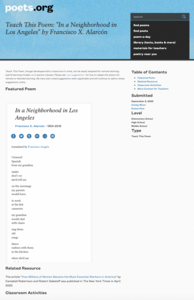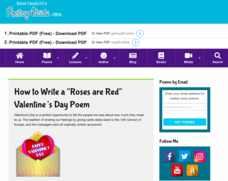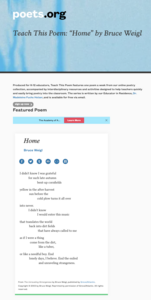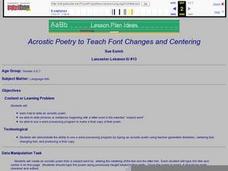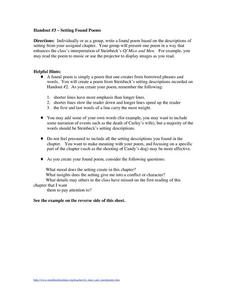Scholastic
Using Poetry to Explore Change and Belonging
Change, growth, and a sense of belonging are the focus of a unit that uses poetry to explore these themes and the distinguishing features of poetry as well.
Curated OER
Everyone Can Write Poetry
Embark on a journey of writing several different types of poetry. Fifth graders read several examples, and use the examples to model their own writing. Each poem is to be accompanied by a different art visual representation. In the end,...
Poetry4kids
How to Write a Concrete or “Shape” Poem
Writers compose an original shape poem. Scholars choose a subject to write about and create a visual representation by forming a corresponding picture using the poem's words.
Teacher's Corner
Shape Poetry
Calligrams, or shape poems, are the focus of ninth exercise in a ten-part poetry writing series.
Poetry4kids
How to Write an Apology Poem
Put a silly spin on making amends with an apology poem. Budding poets think of a time they were made to apologize although they didn't mean it. They then turn their experience into a poem that offers details and ends with an explanation...
Poetry4kids
How to Write a Funny Epitaph Poem
What can happen if you eat too much cafeteria food? Or wear dirty clothes every day? Or talk back to your mother? Use a lesson on humorous poems as a way for students to practice silly rhymes as fictional epitaphs.
Academy of American Poets
Teach This Poem: "In a Neighborhood in Los Angeles" by Francisco X. Alarcón
After sketching an essential person and reading an article, scholars read the poem "In a Neighborhood in Los Angeles" by Francisco X. Alarcón. They listen to the poem in English and Spanish and record lines that stand out to them. Small...
Core Knowledge Foundation
Unit 4: Listen, My Children - Poems for Fourth Graders
Over three weeks, fourth graders explore the world of poetry. They listen to authors such as Shel Silverstein and Maya Angelou, complete word work activities, and practice spelling skills. Budding poets take pen to paper with daily...
National Council of Teachers of English
Acrostic Poems: All About Me and My Favorite Things
Budding poets create two acrostic poems, one for their name and another using a word of their choice. Over the course of five days, scholars compose, revise, publish, and share their work with their peers.
Poetry4kids
How to Recite a Poem like an Expert
Don't just read a poem, recite a poem! Add speaking skills to a poetry unit with an activity that promotes successful poem recitation. Scholars choose a poem then recite it with the help of several tips and videos.
Curated OER
Biographical Poems
Students write a biographical poem about themselves. They observe a teacher-led demonstration, write an autobiographical poem and a biographical poem about a famous person using a template form, and display the poems side-by-side.
Poetry4kids
How to Write a “Roses are Red” Valentine’s Day Poem
Compose a Valentine's Day poem! Practicing their rhyming skills, scholars follow the traditional format to create a happy poem for a friend or family member.
Curated OER
Set a Poem to Music
Fun awaits both you and your class as you embark on a musical activity. After discussing different rhythmic meters they choose a poem to set to music. The poem must rhyme and be set to a melody in the key of C Major. Because the activity...
Poetry4kids
How to Write a Free Verse Poem
Budding poets compose an original free verse poem. Encouraged to use personification and alliteration, scholars read over three tips and examples then try their hand at drafting a poem of their own style.
Poetry4kids
Evoking the Senses in a Poem
Budding poets choose a topic for a sensory-filled poem. Authors describe that topic using detailed language based on the five senses. Then, switch the senses to create a fanciful poem intended to add a touch of fun to the objective.
Academy of American Poets
Teach This Poem: "The Metier of Blossoming" by Denise Levertov
Poetry analysis need not be a lugubrious exercise for young learners. The approach used with Denise Levertov's poem, "The Metier of Blossoming" is one of close observation, of noticing and reflecting on the words, phrases, and images the...
Academy of American Poets
Teach This Poem: “Home” by Bruce Weigl
A poetry lesson takes a close look at home. Scholars discuss with partners what they are most grateful for at their homes. A timelapse video showcases potato tubers growing. While watching, pupils write down what they notice. Learners...
Academy of American Poets
Teach This Poem: “Making History” by Marilyn Nelson
What makes an event newsworthy, worth a reference in a news magazine or textbook? Who decides? These are questions Marilyn Nelson asks readers of her poem "Making History" to consider. To begin, class members list details they notice in...
Curated OER
Spring into Poetry
How many different types of poetry are there? Let me count them; list poems, haiku, and makes-me-think poems are only a few. Learners create their own poems accompanied by artistic projects such as haiku poems written on kites.
Poetry4kids
How to Start a Poetry Journal
Practice makes proficient! Using a journal of their choice, authors organize pages, then begin their writing journey of on-going writing practice in which they compose all poetic forms including diamante, limerick, free verse, and more!
EngageNY
Performance Task: Two-Voice Poem Readings
Eye contact, volume, and pronunciation are key ingredients to a successful presentation. Pupils present their two-voice poems to the class with their poetry reading partners. Next, to wrap up the unit, scholars use a worksheet to reflect...
Curated OER
Poetry Walk
Explore with your class the purposes and author's intents for poetry titles. First you read several brief poems to the class and discuss how the authors may have chosen the titles. Then small groups read title-less poems posted around...
Curated OER
Acrostic Poetry to Teach Font Changes and Centering
Students engage in a discussion about how to write an acrostic poem. They demonstate the ability to use a word processor by typing an acrostic poem by following instructions. Word processing skills such as, centering text, changing font,...
Curated OER
Handout #3-Setting Found Poems
What is a Found Poem? Use excerpts of the setting presented in John Steinbeck's Of Mice and Men to inspire Found Poetry. An explanation is given, and the second page houses an example of a Found Poem inspired by Black Boy, but you'll...








